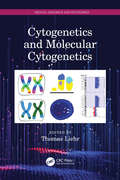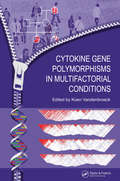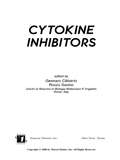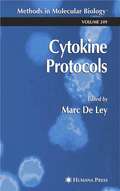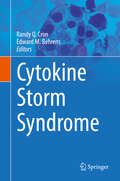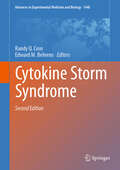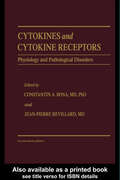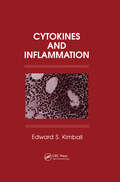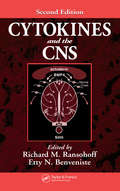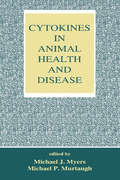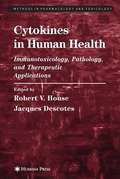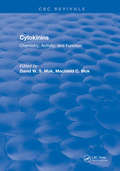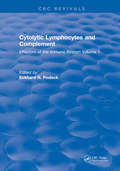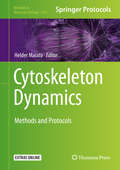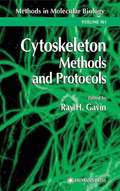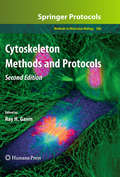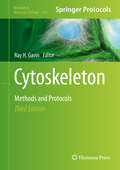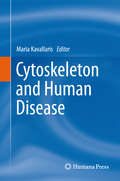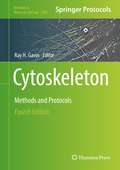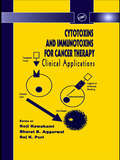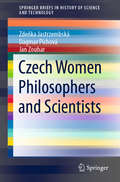- Table View
- List View
Cytogenetics and Molecular Cytogenetics (Medical Genomics and Proteomics)
by Thomas LiehrGenomic technologies provide the means of diagnosis and management of many human diseases. Without insights from cytogenetics, correct interpretation of modern high-throughput results is difficult, if not impossible. This book summarizes applications of cytogenetics and molecular cytogenetics for students, clinicians and researchers in genetics, genomics and diagnostics. The book combines the state-of-the-art knowledge and practical expertise from leading researchers and clinicians and provides a comprehensive overview of current medical and research applications of many of these technologies. KEY FEATURES • Provides clear summaries of fluorescence in situ hybridization technologies and others • Comprehensively covers established and emerging methods • Chapters from an international team of leading researchers • Useful for students, researchers and clinicians
Cytohistology of Small Tissue Samples
by Lester J. Layfield Carlos W. Bedrossian Julia R. Crim Lucio PalombiniEach volume in this richly illustrated series, sponsored by the Papanicolaou Society of Cytopathology, provides an organ-based approach to the cytological and histological diagnosis of small tissue samples. Benign, pre-malignant and malignant entities are presented in a well-organized and standardized format, with high-resolution color photomicrographs, tables, tabulated specific morphologic criteria and appropriate ancillary testing algorithms. Example vignettes allow the reader to assimilate the diagnostic principles in a case-based format. This volume describes the cytologic, small core biopsy, immunohistochemical and molecular diagnostic features of musculoskeletal lesions. It provides the cytopathologist and histopathologist with a comprehensive survey of diagnostic approaches and diagnostic features for benign and malignant lesions. Each chapter contains a detailed summary of differential diagnostic features, supported by high-quality images and case studies. The print edition includes a CD-ROM offering all images in a downloadable format. With over 500 photomicrographs, this is an important resource for practising pathologists and residents in pathology.
Cytokine Gene Polymorphisms in Multifactorial Conditions
by Koen VandenbroeckThe literature on cytokine genetics is vast, so vast that it is now practically beyond the time or logistical constraints of most scientists to successfully keep pace with it. A compilation of the latest research, Cytokine Gene Polymorphisms in Multifactorial Conditions brings together, reviews, and structures up-to-date information on polymorphism
Cytokine Inhibitors
by Gennaro Ciliberto Rocco SavinoCompiling an up-to-date and detailed survey of the role cytokines play in cell-to-cell communication, development, and differentiation, this comprehensive reference highlights the medical advantages of cytokine inhibition and pursues novel methods of discovery for more potent and specific blocking agents. Investigates the pathogenic role of
Cytokine Protocols (Methods in Molecular Biology #249)
by Marc De LeyA collection of biochemical, cellular, and molecular techniques for unraveling and quantifying the events occurring between the initial contact of a cytokine at the membrane receptor and the eventual activation of gene transcription. The techniques used include the generation of transfectants, the immunohistochemical detection of cytokines in tissue sections, and optimized staining for cytoplasmic detection. Highlights include RT-PCR of small amounts of mRNA, in situ hybridization, biosensor analysis, measurement of biological activities and standardization, immunohistochemical and single-cell detection, and receptor isolation, characterization, and crystallization.
Cytokine Protocols, 2nd Edition (Methods in Molecular Biology #820)
by Marc De LeyRecent studies have discovered new known and characterized cytokines, allowing for advancement in miniaturization of micro-analytical methods as well as the extensive development of bio-informatics and nanotechnology. These advancements have allowed researchers to reduces sample sizes making for more accurate determinations then previously possible. In Cytokine Protocols: Second Edition, expert researchers in the field detail many of the methods which are now commonly used to study cytokines. These methods and techniques for studying cytokines include historical importance and the importance of researchers using bioassay, quantification, and characterization of cytokine related RNAs, posttranscriptional modifications of RNA, either naturally or artificially, and observations at the protein level. Written in the highly successful Methods in Molecular Biology™ series format, the chapters include the kind of detailed description and implementation advice that is crucial for getting optimal results in the laboratory.<P> Authoritative and practical, Cytokine Protocols: Second Edition seeks to aid scientists in furthering the crucially important advancement of cytokine research
Cytokine Storm Syndrome
by Randy Q. Cron Edward M. BehrensCytokine Storm Syndromes, including HLH and MAS, are frequently fatal disorders, particularly if not recognized early and treated during presentation. The genetics of Cytokine Storm Syndromes are being defined with many of the risk alleles giving rise to mutations in the perforin-mediated cytolytic pathway used by CD8 cytotoxic T cells and natural killer cells. These are being studied using murine models. Up to 10% of the general population may carry risk alleles for developing Cytokine Storm Syndromes, and Cytokine Storm Syndromes are being increasingly recognized around the world in pediatric and adult hospitals.A variety of infectious, rheumatic, and oncologic triggers are commonly associated with Cytokine Storm Syndromes, but understanding this disorder is critical for all researchers and physicians to ensure timely and appropriate therapy. This textbook, the first of its kind, addresses all aspects of the disorder – from genetics, pathophysiology, and ongoing research, to clinical presentations, risk factors, and treatment.
Cytokine Storm Syndrome (Advances in Experimental Medicine and Biology #1448)
by Randy Q. Cron Edward M. BehrensCytokine Storm Syndromes, including HLH and MAS, are frequently fatal disorders, particularly if not recognized early and treated during presentation. The genetics of Cytokine Storm Syndromes are being defined with many of the risk alleles giving rise to mutations in the perforin-mediated cytolytic pathway used by CD8 cytotoxic T cells and natural killer cells. These are being studied using murine models. Up to 10% of the general population may carry risk alleles for developing Cytokine Storm Syndromes, and Cytokine Storm Syndromes are being increasingly recognized around the world in pediatric and adult hospitals. A variety of infectious, rheumatic, and oncologic triggers are commonly associated with Cytokine Storm Syndromes, but understanding this disorder is critical for all researchers and physicians to ensure timely and appropriate therapy. This second edition addresses all aspects of the disorder, from genetics, pathophysiology, and ongoing research, to clinical presentations, risk factors and treatment. New-to-this-edition features include dedicated chapters on severe COVID-19 CSS, and post-COVID CSS of multi-system inflammatory syndrome in children (MIS-C). In addition, novel topics including CSS associated with Castleman disease, pregnancy, therapeutics, transplantation, and cardiac bypass, as well as treatment with JAK inhibitors are addressed.
Cytokines and Cytokine Receptors: Physiology and Pathological Disorders
by Constantin A. Bona Jean-Pierre RevillardThe field of cytokine research is expanding at a rapid pace Contributions from the major leading groups in the world on the structure and biological properties of cytokine and cytokine receptors, as well as integrated reviews on cytokines in various physiological and pathological conditions were presented in three issues of International Reviews of
Cytokines and Inflammation
by Edward S. KimballThis important new book focuses on the involvement of cytokines in specific areas of inflammatory diseases, such as granulomatous responses, lung disease, hepatic dysfunction and the acute phase, arthritis and accompanying bone remodeling, neurogenic inflammation, and shock. The roles of GM-CSF, IL-6, IL-2, TGFb EGF, and LIF are discussed, as well as the medical treatments that affect cytokine activity. The results of approaches important to the biotechnology and pharmaceutical industries, such as the search for endogenous biological response modifiers that control cytokine function or production, attempts to synthesize heterocyclic compounds in the organic chemistry lab, and research regarding second messenger pathways involved in IL-1 and TNF production are examined. This book will provide anyone in cytokine research, especially clinical investigators, pharmaceutical industry researchers, and academic research scientists, with important information on how cytokine research might be used.
Cytokines and the CNS
by Richard M. Ransohoff Etty N. BenvenisteProvides Insight into How Cytokine Action Impacts the Physiology and Pathology of the CNS.As with the first edition of Cytokines and the CNS, this completely updated and revised edition introduces neurobiologists to cytokine biology and immunologists to the unique functions of cytokines in CNS physiology. The dramatically accelera
Cytokines in Animal Health and Disease
by Michael J. Myers and Michael P. MurtaughThis work offers comprehensive, up-to-date coverage of cytokine biology in veterinary and agricultural species, describing the role of cytokines in physiological and pathological processes. It addresses recent advances and new information on the function of cytokines in reproduction, detoxification of xenobiotics, growth modulation and other areas, and discusses the approaches to and pitfalls of studying cytokines in animals.
Cytokines in Human Health: Immunotoxicology, Pathology, and Therapeutic Applications (Methods in Pharmacology and Toxicology)
by Jacques Descotes Robert V. HouseThis comprehensive book explores the role of cytokines in immunotoxicology and human health using a variety of complex methods, from basic research to highly applied therapeutic applications. It includes a basic study of cytokines and details the effects of cytokines on the immune system and in treating cancer. The book serves as both a primer and a starting point for a more detailed investigation of the role these biological regulators play.
Cytokinins: Chemistry, Activity, and Function
by David W. MokCytokinins are hormones involved in all aspects of plant growth and development and are essential for in vitro manipulation of plant cells and tissues. Much information has been gathered regarding the chemistry and biology of cytokinins, while recent studies have focused on the genetics and cytokinin-related genes. However, other than proceedings of symposia, no single volume on cytokinins has been written. This book is the first of its kind, homing in on the key subject areas of cytokinin-chemistry, biosynthesis, metabolism, activity, function, genetics, and analyses. These areas are comprehensively reviewed in individual chapters by experts currently active in the field. In addition, a personal history on the discovery of cytokinin is presented by Professor Folke Skoog. This volume summarizes previous findings and identifies future research directions.
Cytolytic Lymphocytes and Complement Effectors of the Immune System: Volume 1
by Eckhard R. PodackThese volumes, Cytolytic Lymphocytes and Complement: Effectors of the Immune System, originate from the realization that pathways of recognition and killings of foreign targets follow similar routes in the humoral and cellular part of the immune system. In particular, the homology of immunoglobins with the T-cell-MHC-antigen receptor at the beginning of the recognition sequence and the homology of complement component C9 with lymphocyte perforin 1 (P1) as pore formers at the end of the effector sequence are striking examples.
Cytopreparation: Principles & Practice (Essentials in Cytopathology #12)
by Gary GillCytopreparation: Principles & Practice by Gary W. Gill fills a long-standing need for an easy-to-use and authoritative manual on the fundamentals of cytopreparation up-to-and- including microscopy, screening, and data analysis. The text describes in phenomenological terms the most common materials and methods of specimen collection through mounting for gyn, non-gyn, and FNA specimens, as well as the underlying mechanistic bases. The author provides his expertise and information that will empower and enable readers to review and improve their laboratories' cytopreparatory techniques as they apply to the vast majority of specimens. This unique volume provides facts that are not readily available anywhere. Cytopreparation: Principles & Practice is intended for everyone associated with, and involved in, making cytologic preparations that are useful for their intended purpose. It will serve as a valuable reference tool for educators in cytology and histology, cytotechnology and histotechnology students, cytotechnologists, cytopreparatory technicians, cytopathologists, anatomical/clinical pathologists, pathology residents and cytopathology fellows.
Cytoskeleton Dynamics: Methods and Protocols (Methods in Molecular Biology #2101)
by Helder MaiatoThis volume details comprehensive state-of-the-art methods on actin microfilaments and microtubules and how they work to achieve different cellular functions in different cellular contexts. Chapters guide readers through protein purification, in vitro reconstitution of several cytoskeleton properties, analyses of microtubule- and actin-based structures, functional dissection of post-translational modifications, and roles in several biological processes. Written in the highly successful Methods in Molecular Biology series format, chapters include introductions to their respective topics, lists of the necessary materials and reagents, step-by-step, readily reproducible laboratory protocols, and tips on troubleshooting and avoiding known pitfalls. Authoritative and cutting-edge, Cytoskeleton Dynamics: Methods and Protocols aims to provide a wide range of experimental approaches and be an invaluable resource for present and future generations of cytoskeleton researchers.
Cytoskeleton Methods and Protocols (Methods in Molecular Biology #161)
by Ray H. GavinMany recent advances in experimental instrumentation, reagents, and imaging technology have dramatically expanded the range of tools available for the study of the cytoskeleton. In Cytoskeleton Methods and Protocols, Ray Gavin brings together an international panel of experienced researchers to detail the readily reproducible methods that utilize biochemistry, immunology, genetics, microscopy, and image analysis for investigating cytoskeleton structure and function. Each protocol contains proven step-by-step instructions that enable both the novice and experienced researcher to achieve successful experimental results. The protocols utilize diverse model systems in a variety of organisms, including Saccharomyces, Micrasterias, Tetrahymena, Drosophila, Spisula, and Xenopus. Microscopy applications include digital-video microscopy and computer-assisted systems for the evaluation of cell motility and morphology. Help notes and tips accompany each protocol and provide additional, often unpublished, information that can make the difference between success and failure. <P><P> State-of-the-art and highly practical, Cytoskeleton Methods and Protocols makes available a diverse collection of powerful experimental systems and tools for successfully studying cytoskeleton structure and function.
Cytoskeleton Methods and Protocols, 2nd Edition (Methods in Molecular Biology #586)
by Ray H. GavinIn the ten years since the publication of the first edition, great advances in fluorescent labeling, optics, and sample preparation have significantly improved the imaging capability of microscopy, allowing for a continual refinement of our understanding of the cytoskeleton as a dynamic synergy of components. In Cytoskeleton Methods and Protocols, Second Edition, internationally renowned experts present techniques which reflect many of the recent technological advances in experimental tools for cytoskeleton research with emphasis on animal, plant, protist, and fungal model systems. This cutting-edge volume contains methods for live-cell imaging, fluorescence microscopy, electron microscopy, analysis of cell and organelle motility, isolation of cytoskeleton components, and proteomics, amongst other topics. As a volume in the highly successful Methods in Molecular Biology™ series, chapters incorporate introductions to their respective subjects, lists of the necessary materials and reagents, step-by-step, readily reproducible laboratory protocols, and notes that provide unpublished technical information on troubleshooting and avoiding known pitfalls.<P><P> Up-to-date and comprehensive, Cytoskeleton Methods and Protocols, Second Edition serves as an ideal guide to scientists who wish to continue this fruitful and important biological research.
Cytoskeleton Methods and Protocols, 3rd Edition (Methods in Molecular Biology #1365)
by Ray H. GavinThe third edition of this volume focuses on experimental models that are useful for investigating various aspects of cytoskeleton structure and function. Animal, plant, protist, and fungal models highlight twenty-four chapters that provide detailed protocols for live and fixed-cell imaging, dynamics of cytoskeleton components, cell and organelle motility, and genetics and proteomics. Written in the highly successful Methods in Molecular Biology series format, protocols in each chapter are up-to-date menus organized in a useful step-by-step format appropriate for novice and established investigators. Each chapter is equipped with a valuable notes section that provides a troubleshooting guide and helpful, and often unpublished, technical information aimed at ensuring success with implementation of the protocols.<P><P> Authoritative and thorough, Cytoskeleton Methods and Protocols, Third Edition helps researchers expand their understanding of cytoskeleton structure and function.
Cytoskeleton and Human Disease
by Maria KavallarisThe cytoskeleton is comprised of a variety of specialized proteins, and is a dynamic structure that is involved in the majority of key cellular events. There is increasing interest in the role of the cytoskeleton in human disease. This volume brings together human disease states where cytoskeletal disruptions are driving disease. Our emerging understanding of the molecular and cellular events that drive cytoskeletal mediated diseases including cancer, heart disease, myopathies and skin disorders, are also helping shape targeted therapeutic approaches to treating these diseases.
Cytoskeleton: Methods and Protocols (Methods in Molecular Biology #2364)
by Ray H. GavinThe fourth edition provides new and updated chapters that focus on experimental models, useful for investigating various aspects of cytoskeleton structure and function. Chapters detail protocols on animal models, plant models, protist models, fungal models, live and fixed-cell imaging, dynamics of cytoskeleton components, cell and organelle motility, genetics, and proteomics. Written in the format of the highly successful Methods in Molecular Biology series, each chapter includes an introduction to the topic, lists necessary materials and reagents, includes tips on troubleshooting and known pitfalls, and step-by-step, readily reproducible protocols. Authoritative and cutting-edge, Cytoskeleton: Methods and Protocols, Fourth Edition aims to provide an updated version to help researchers expand their understanding of cytoskeleton structure and function.
Cytotoxic T-Cells: Methods and Protocols (Methods in Molecular Biology #2325)
by Elena Ranieri Margherita GiganteThis new edition explores lab protocols describing new techniques to study cytotoxic T-cells (CTLs), as well as chapters of a more general discursive nature, all with an emphasis on the use of systems biology in immunology. Beginning with phenotypical characterization of CTL populations, the volume continues with in vitro and in vivo cytotoxicity assays, methods to detect senescent T cells, in vivo and in vitro models to understand immune and bone cells cross-talk, microscopy and in vivo imaging, as well as “Omics” approaches and molecular methods, concluding with chapters on CTL involvement in transplantation and link microbiota-immunity. Written for the highly successful Methods in Molecular Biology series, chapters feature the kind of detail and key implementation advice for best results in the lab. Authoritative and up-to-date, Cytotoxic T-Cells: Methods and Protocols, Second Edition serves as an ideal guide for researchers working with these vital cells.
Cytotoxins and Immunotoxins for Cancer Therapy: Clinical Applications (Pharmaceutical Science Ser.)
by Bharat B. Aggarwal Koji Kawakami Raj K. PuriRecent advances in cytotoxins and immunotoxins are accelerating our understanding of cancer and leading to more effective therapeutic treatments. Although a large number of articles have been published on these cytotoxins and immunotoxins, this important information has yet to be compiled into one comprehensive resource.For the first time,
Czech Women Philosophers and Scientists (SpringerBriefs in History of Science and Technology)
by Zdeňka Jastrzembská Dagmar Pichová Jan ZouharThis book examines the most important Czech women philosophers and scientists. It highlights the lives and achievements of a group that has often not received the recognition they deserve. Chapters provide a systematic description and critical evaluation of the impact these women had on the history of philosophy and science. After an opening chapter on the status of women philosophers and scientists in the period before 1820, the book explores the role women played in the 19th century rise of Czech culture (Czech National Revival). The following chapter then introduces the situation of Czech women philosophers and scientists in the 20th century. The authors base the material on analysis of key works and the characteristics of contemporary debates in which these women participated. The volume describes the complex conditions of women in Czech history in relation to the position of learned women in other European countries. The authors also emphasize their link to the historical background. This encompassing coverage helps provide readers with a richer understanding of these important women and the period in which they lived. Academicians and the general public alike will also learn about the political and social limitations these women faced and the influence of historical conditions on their work.
